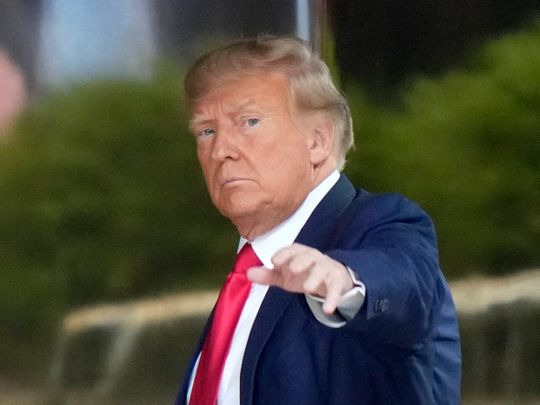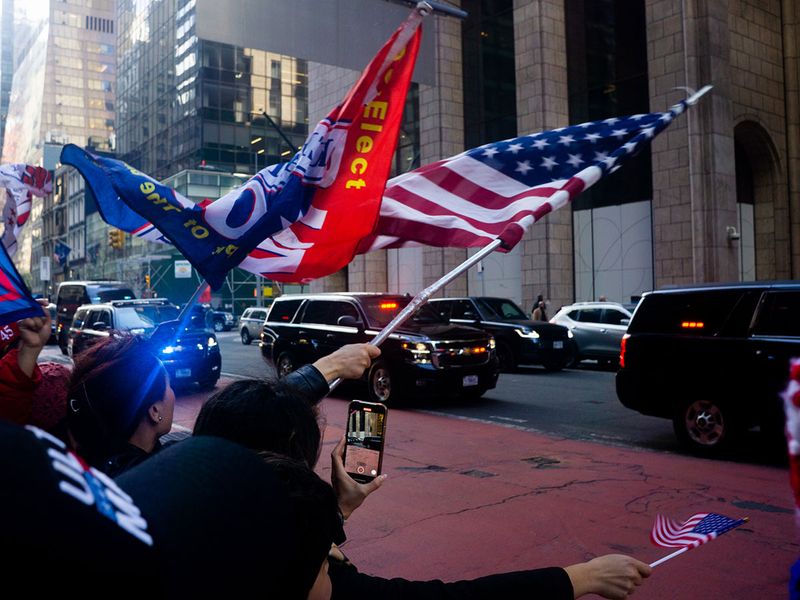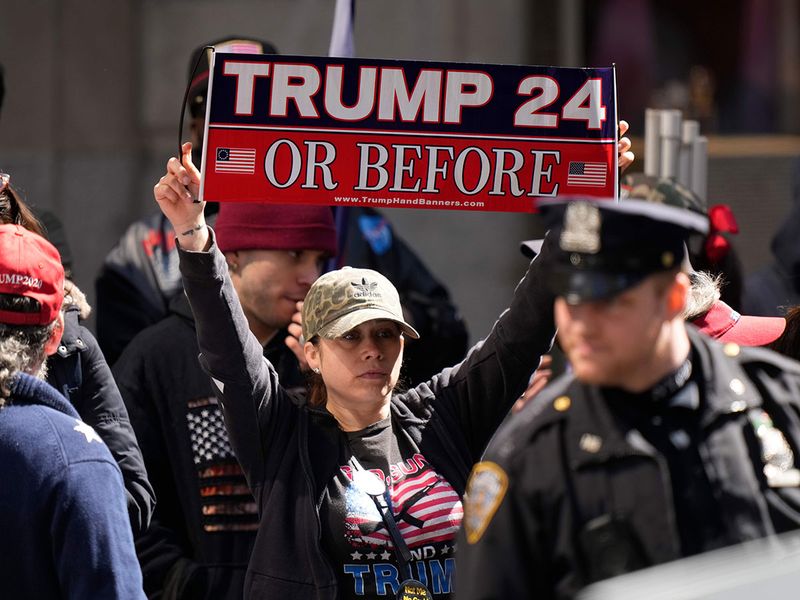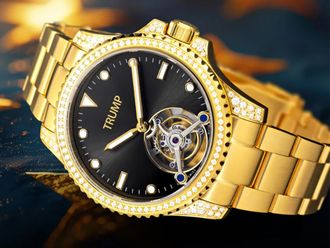
New York: Donald Trump, the ex-president and frontrunner to be Republican nominee in 2024, will appear in court on Tuesday and is set to be formally charged, finger-printed and have a mug shot taken in a watershed moment ahead of next year's presidential election.
Trump was indicted last week, becoming the first sitting or former president to face criminal charges, over a case involving a 2016 hush money payment to porn star Stormy Daniels. He has said he is innocent and is due to plead not guilty.
Trump will turn himself in on Tuesday amid tight security as demonstrations were expected for and against a man who has riled liberals and some global allies but is lauded by many white blue-collar and conservative Christian voters.
"We have to take back our Country and, MAKE AMERICA GREAT AGAIN!" Trump wrote on his Truth Social profile shortly after arriving in New York from Florida on Monday, urging supporters to donate to his campaign.
The arraignment, where Trump will be in court to hear charges and have a chance to enter a plea, was planned for 2:15 p.m. (1815 GMT) on Tuesday.
Trump's lawyers opposed videography, photography and radio coverage, saying it would "exacerbate an already almost circus-like atmosphere around this case", detracting from dignity and decorum.
READ MORE
- Donald Trump to surrender in a New York Court. What happens next?
- US: Who is Stormy Daniels, the adult-film star linked to former US president Trump’s indictment?
- Trump court appearance: America faces a fateful moment
- US: What’s next for former president Donald Trump after indictment
- US: Who is the Manhattan District Attorney prosecuting former president Donald Trump?
Judge Juan Merchan late on Monday ruled that five photographers will be admitted before the arraignment starts to take pictures for several minutes until they must stop, with cameras allowed in the hallways of the building.
The District Attorney Alvin Bragg, a Democrat, who led the investigation, will later give a news conference in the afternoon.
Trump will return to Florida and deliver remarks from Mar-a-Lago at 8:15 p.m. on Tuesday (0015 GMT on Wednesday), his office said.
An indictment is a court document containing charges that were voted on by a grand jury, a group of people who decide whether a prosecutor has enough evidence to pursue criminal charges.
An indictment formally charges a defendant with a crime and provides a basis for legal prosecution.
Following an indictment, a defendant is given formal notice of the charges, a right enshrined in the Fifth Amendment of the U.S. Constitution.
A defendant can then be formally arraigned on whatever charges are brought. Law enforcement officials fingerprint and photograph most defendants facing arraignments.
The specific charges in the indictment by a grand jury convened are due to be disclosed on Tuesday. Trump and his allies have portrayed the charges as politically motivated.
Yahoo News late on Monday said Trump would face 34 felony counts for falsification of business records. Citing a single source briefed on Tuesday's arraignment procedures, Yahoo said none of the charges against Trump were misdemeanors.

No cameras in courtroom
In the latest move, a New York-based judge has issued a ruling on Monday that no video cameras will be allowed in the courtroom where the former US President Donald Trump will be arraigned, and gave a nod to only a handful of photographers who will be allowed to take pictures in the premises, The Hill said citing media reports.
The ruling was issued by New York Judge Juan Merchan on Monday night
New York Judge Juan Merchan ruled on Monday night that a handful of photographers will be allowed to take pictures in the courtroom where former President Trump will be arraigned on Tuesday, but he will not allow video cameras, according to reports.
After Trump's legal team argued against having cameras in the courtroom, claiming that it would create a "circus-like" environment, Merchan made his decision, according to The Hill.
Five still photographers will be permitted access to the courtroom for a period of time before being asked to leave, according to the decision, which was reported by ABC News.
No electronic devices would be permitted in the main or backup courtrooms, according to the judgement.
Protests and popularity
Police over the weekend began erecting barricades near Trump Tower - where Trump arrived on Monday after flying in from Florida - and the Manhattan Criminal Court building, with demonstrations expected at both sites on Tuesday.
The city's mayor warned potential rabble-rousers to behave.
"Our message is clear and simple: Control yourselves. New York City is our home, not a playground for your misplaced anger," Eric Adams said.

Asked if he was worried about unrest, President Joe Biden, a Democrat who is widely expected to seek re-election and face a potential rematch against Trump, said: No, I have faith in the New York Police Department." The case has divided people in New York, where Trump's name is emblazoned on buildings related to his business ventures.
"It's a terrific day. I hope it goes well and that he is eventually found guilty," said New Jersey resident Robert Hoatson, 71, outside Trump Tower on Monday.
But Trump backer Susan Miller, leaning against the metal barriers on 5th Avenue just south of Trump Tower on Monday evening, said she hoped the show of support would "give him a little strength when he goes down... to battle." "He's honest as the day is long" she said, adding she planned to return on Tuesday.
Trump's lead has widened over rivals in the Republican Party's presidential nominating contest, according to a Reuters/Ipsos poll released on Monday, conducted after news broke that he would face criminal charges.
Some 48% of self-described Republicans say they want Trump to be their party's presidential nominee, up from 44% in a March 14-20 poll. Second-place Florida Governor Ron Desantis fell from 30% to around 19%.
Judges in New York state criminal court have three options for bail: They can set bail, order a defendant released without bail, or order a defendant's detention.
The purpose of bail in New York is to ensure that a defendant returns to court, without taking into account the risk a defendant may cause further harm. In 2019, New York ended cash bail for most cases involving misdemeanors and nonviolent felonies, such as Trump's case.
Multiple legal woes
The Manhattan grand jury that indicted Trump heard evidence for months this year about a $130,000 payment to adult film actress Stormy Daniels in the waning days of the 2016 presidential campaign.
Daniels has said she was paid to keep silent about a sexual encounter she had with Trump at a Lake Tahoe hotel in 2006.
Trump denies having had any such relationship with her.
An indictment or even a conviction do not legally prevent Trump from running for President.
Beefing up his legal team, Trump hired Todd Blanche, a prominent white-collar criminal defense lawyer and former federal prosecutor, to join his defense, two sources familiar with the matter said.
The Manhattan investigation is just one of several legal challenges concerning Trump.
Trump also faces a separate criminal probe into whether he unlawfully tried to overturn his 2020 election defeat in Georgia, and two investigations by a special counsel including over his handling of classified documents after leaving office.
Any potential trial in the Manhattan case is still at least more than a year away, legal experts said, meaning it could occur during or after the presidential campaign.
Trump's campaign raised $7 million in the three days after word of the indictment emerged last Thursday, senior adviser Jason Miller said, and issued the latest in several fundraising emails, taking aim at the media's reporting of the indictment.
2024 Ramifications
What effect the case has on Republicans deciding on their candidate for the November 2024 Presidential election, and the choice all Americans then make, could have profound implications in the world's most powerful country and beyond its borders.
Leading potential challengers for the nomination, including Desantis and his former vice president Mike Pence, have publicly rallied around Trump in recent days.
While president between 2017 and 2021, Trump regularly clashed with allies over trade and defense, and a return to the Oval Office looks set to weaken U.S support for Ukraine.
On the Manhattan case, Trump in 2018 initially disputed knowing anything about the payment to Daniels.
He later acknowledged reimbursing Cohen for the payment, which he called a "simple private transaction." In 2018, Cohen pleaded guilty to campaign finance law violations for his role in orchestrating the payments to Daniels and McDougal and was sentenced to three years in prison. He testified that Trump directed him to make the payments.
Cohen testified before the Manhattan grand jury investigating Trump on March 13.
Following Trump's indictment, he told Reuters: "I decided that I was not going to allow history to remember me as the villain to his story."











